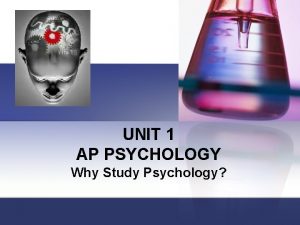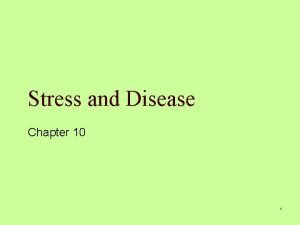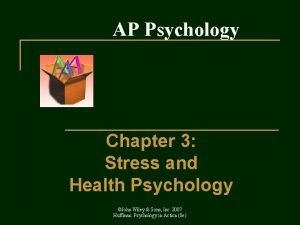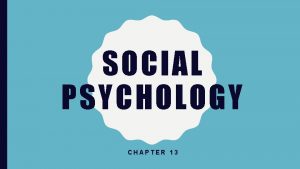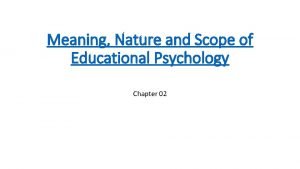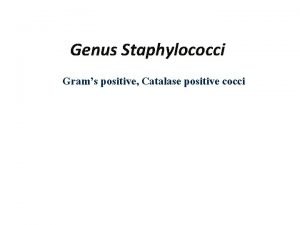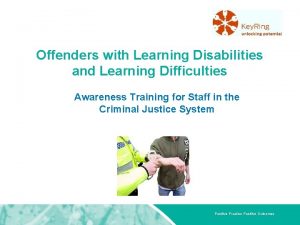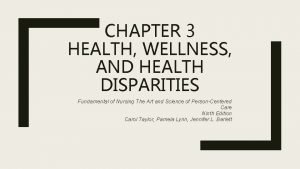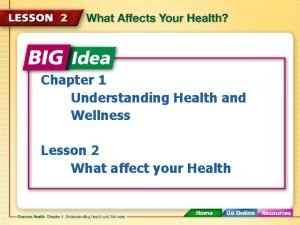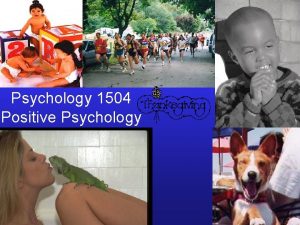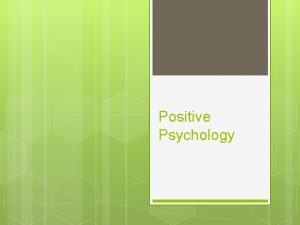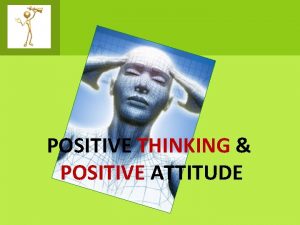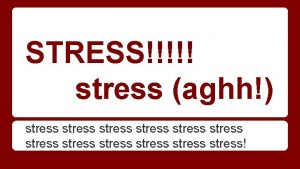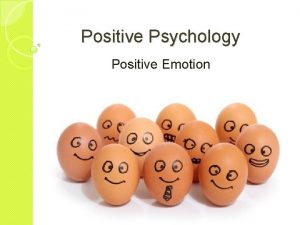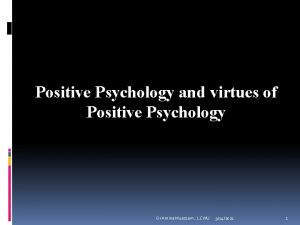Positive Psychology Health and Stress Chapter 14 Stress










- Slides: 10

Positive Psychology: Health and Stress Chapter 14

Stress • Stress: physical and emotional reaction to events in life • Primary appraisal: judgment of an event to determine if it may have a negative affect on one’s wellbeing or life • Secondary appraisal: evaluation of one’s own ability to handle the event • Uncontrollable events lead to greater stress

Psychoneuroimmunology: stress changes the brain Sympathetic Nervous system and the fight or flight response Physiology of Stress Cortisol (stress hormone) has neurotoxic effects • Children of people who are chronically stressed have lower IQ and lowered neurogenesis and is correlated with income level (Evans & Schamberg, 2009) • Affects immune system • Associated with increased risk for: obesity, heart disease, cancer.

Physiology of stress • Fight-or-Flight response of sympathetic nervous system • • SAM Axis sympathetic adrenal-medullary system • • Adrenal medulla (AM) is the hormone secreting tissue within the adrenal gland Hypothalamus triggers AM to secrete epinephrine and norepinephrine Epinephrine triggers release of glucose for energy Epinephrine and norepinephrine increase cardiac output by increasing blood pressure and heart rate (increase distribution of blood glucose and O 2 for energy) HPA Axis Hypothalamic Pituitary Adrenal system • Amygdala, Hypothalamus, and pituitary triggers adrenal cortex to secrete glucocorticoid hormones (esp. cortisol) • Cortisol stimulates metabolism, stimulates the brain for behavioral response, activates emotional response in limbic system, also suppresses sex hormones

• Sympathetic response is meant to be short-term only • • Chronic stress means chronically elevated levels of stress hormones Effects • Hypertension (elevated blood pressure) • • Long term health risks Hyperglycemia (steroid-induced diabetes) • • Obesity, nerve damage, muscle fiber damage Suppression of growth hormone Fertility problems and reduced sex-drive Suppression of immune system • • Cardiovascular disease Ulcers, susceptibility to various infectious diseases Neurotoxicity – decreased glucose absorption and decrease glutamate reuptake • Glutamate stimulates neurons too much = neural excitotoxicity = cell death • • Esp in hippocampus and PFC Impaired memory and attention, insomnia, mood disorders

Psychoneuroimmunology • • Complex interactions btwn stress hormones, brain, and immune system Immune response • • T cells (produced in thymus gland) kill infectious agents directly • Cytokines serve as chemical messengers between T-cells and leukocytes in coordinating the attack Various other white blood cells (leukocytes) are activated to attack infectious agents • • • Glucocorticoid hormones dysregulate immune response by altering cytokine secretion Global immune response is weakened = susceptibility to infectious disease, prolonged healing Localized immune response can be magnified = chronic localized inflammation • Cardiovascular disease, cancer, autoimmune disease (Type II diabetes, inflammatory bowel diseases, arthritis, systemic lupus, but see also Alzheimer’s, Parkinson’s, Huntington’s diseases), allergen response

• Diathesis. Stress model Environmental stressors activate bodily dispositions to illness • Epigenetic effects: activating genetic sequences that trigger illness • • Old injuries “acting up” Underlying health conditions exacerbated by stress (psychosomatic conditions) • E. g. , eczema, irritable bowel, “sick response” (triggered by non-specific immune response: feeling ill) • See also hypochondriasis aka Illness Anxiety Disorder

Coping • Problem focused coping • Emotion focused coping • Defensive coping • Emotional insulation

Positive emotions Positive Psychology Claim: reducing stress and improving mood can increase health and well-being Engagement (flow) Achieved via PERMA Relationships Meaning Accomplishment Being “in the zone”, fully immersed in an experience

Attention Restoration Theory • Exposure to nature improves cognitive and emotional functioning • Dates back to Thoreau and Walden • • New research confirms that nature: • • • Biophilia: humans have a natural love/fascination with nature Reduces feelings of stress May improve working memory function But: inconsistent replication • Emotional (but not cognitive) restoration can occur in “virtual nature” • “Casual” video games also have a similar effect
 Positive psychology ap psychology definition
Positive psychology ap psychology definition Chapter 10 stress responses and stress management
Chapter 10 stress responses and stress management Health psychology definition ap psychology
Health psychology definition ap psychology Group thinking psychology
Group thinking psychology True strain formula
True strain formula Nature educational psychology
Nature educational psychology All staphylococci are catalase positive
All staphylococci are catalase positive Negative number rules
Negative number rules Positive practice positive outcomes
Positive practice positive outcomes Chapter 3 health wellness and health disparities
Chapter 3 health wellness and health disparities Chapter 1 understanding health and wellness lesson 2
Chapter 1 understanding health and wellness lesson 2
